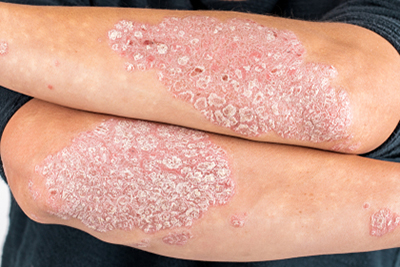Psoriasis is a condition that affects many people to varying degrees. Learning to live with your dry skin condition can be challenging, but Dr. Linda Park Nims, Dr. Rebecca Barry, and Dr. Kelley Redbord are all board-certified in Dermatology and Dr. Redbord is certified in Mohs surgery at the Dermatology & Dermatologic Surgery Group of Northern Virginia in Vienna, VA. They want to explain psoriasis.
What Is Psoriasis?
Psoriasis is caused by an autoimmune disease in which your immune system flares up causing reddened, thickened areas of skin all over your body called plaques.
Dermatology & Dermatologic Surgery Group of Northern Virginia in Vienna, VA, explains that plaques can be dry, itchy, and uncomfortable. Usually, they develop scaly skin that falls off by exfoliating.
There is no cure for this condition, but is manageable once our doctors understand what type of skin issues you have. Listed below are the types of skin conditions that you may have.
- Pustular - Pus-filled bumps on top of the plaques
- Erythrodermic - Mass-affected skin with plaques and active shedding of the skin
- Inverse - Shows up in skin creases across your body, and it does not have scales
- Guttate - A skin disorder developing in children or adults after a streptococcal infection
- Plaque - The most common type of skin condition
- Sebopsoriasis - Found on the face, yellow and greasy in appearance
This skin condition can affect any part of our body but is found mainly on the face, hands or feet, pelvic area, scalp, lower back, elbows, and knees. Once you have this skin condition you can get "flares" that can cause the condition to worsen.
Flares can be caused by a multitude of things including dietary changes, changes in weather, emotional stress, medication, and infection or injury.
Diagnosis and Treatment of Psoriasis
Diagnosis involves our doctors doing a skin check of the affected area. This could include taking a skin scrape or biopsy where some of the affected tissue is removed and reviewed under a microscope for a proper diagnosis.
After you receive your diagnosis, things can be done to reduce the strength and duration of a flare.
- Reduce your sugar intake
- Steroid creams
- Medicated Shampoo and Conditioner
- Medications slow skin cell production
- Vitamin A or vitamin D lotions
Treatment not only involves the above options, but you also know your body. Pay attention to flares and watch for things that trigger your skin issues and call us at (703) 938-5700. Dr. Nims, Dr. Barry, and Dr. Redbord of Dermatology & Dermatologic Surgery Group of Northern Virginia in Vienna, VA, look forward to meeting with you about your psoriasis issues.
